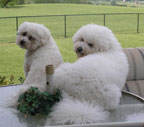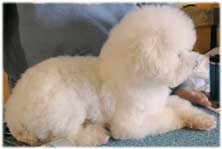|
SOCIALIZATION OF
YOUR PUPPY |
Puppies all tend to be cute .
.. but they don't come into our world automatically knowing and trusting
humans or the myriad of sometimes 'scary' life situations. Puppies need to
be gently taught about visitors, automobiles, vacuum cleaners, bicycles,
children and so much more. If they are not quietly exposed to
people, other animals, and normal stimuli in their environment, they may
grow up to become fearful, anxious, antisocial adult dogs. |
The first few months of a
puppy's life are the most critical for development of
confidence and trust. The socialization process should begin while the
puppy is still with it's mother. Responsible breeders will expose
the pups to normal household activities while still being cautiously
prudent about not exposing the puppies to germs to which they may be
susceptible. Good breeders know that the mother
should play an integral part in teaching the puppy and the other siblings
proper dog behavior about social skills, manners about biting too hard in
play, being polite, sharing toys and going outside to go potty.
As soon as you get the new
puppy . . . .start with simple, quiet, positive one-person
introductions, and gradually include more people in noisier situations.
Invite patient, gentle friends, relatives, and their pets to come to the
home to meet, greet, and play with the pup. BE CAREFUL NOT TO
OVERWHELM AND SCARE YOUR PUPPY!!
As soon as your veterinarian
says your puppy is adequately vaccinated, take it on as many
walks and outings as is possible. Avoid situations that might be high risk
for disease such as neighborhood dog parks or areas with multiple stray
dogs.
To make introductions positive
and special, give a very delicious small treat to the puppy
whenever it meets a new friend. If your puppy seems exceptionally
cautious when introduced to situations or stimuli, start off with mild
exposure, and give food rewards for non-fearful responses. |
It's very important that your
puppy meets a variety of people of all ages and appearances. A
puppy that grows up in a restricted social group (e.g. all adults or all
females) may show fear and aggression when later exposed to people who
appear or act significantly different (e.g. children, men with beards).
|
An excellent way to promote
early socialization is to take your puppy to training classes.
Ask your veterinarian or groomer about positive training classes in your
area. Basic classes in obedience, tricks, and elementary
agility can all lend themselves to building confidence and trust in your
young or old dog.
KEY ELEMENT: Positive training
and exposure is the real key to developing a trusting dog.
Punishment during the early development stages can inversely impact good
people skills. Avoid training any method that involves physical
discipline, such as swatting the pup, thumping it on the nose, or rubbing
its face in a mess. |
If you don't
have the capacity & time to invest in proper socialization, please don't
buy a puppy or adopt a shy adult dog.
Constructive socializing and shaping your puppy's temperament requires an
investment in time. Done well, you will find that your efforts
are well worthwhile when you become the proud parent of a social, friendly
dog. |
| |
| |
| |
| |
| |

